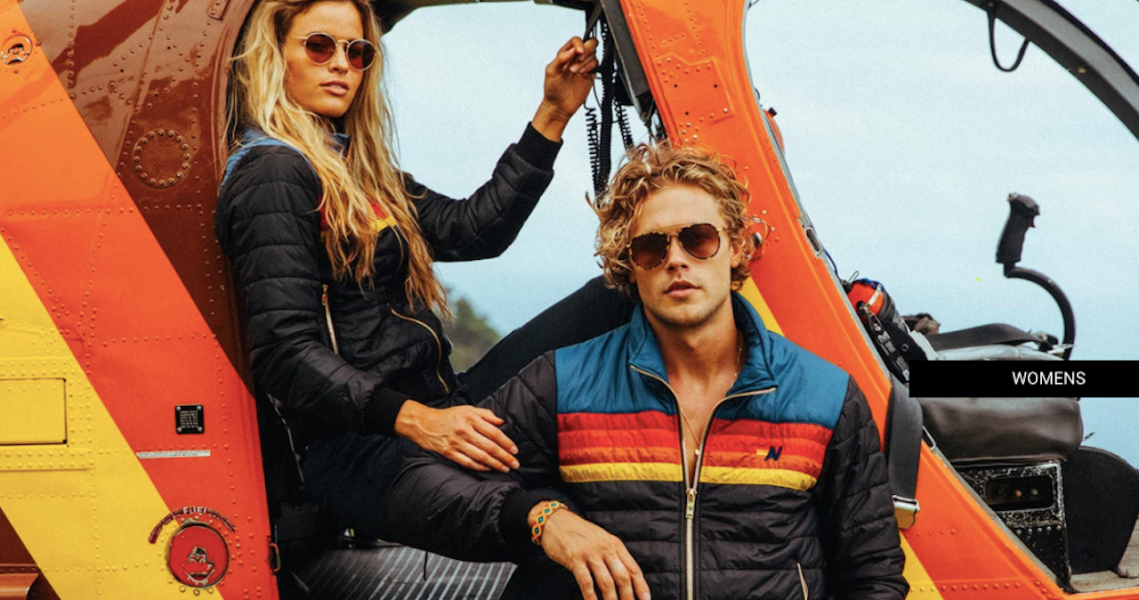Aviator Nation, a casualwear brand based and produced in California, is determined to maintain a sales flow, shelter-in-place order be damned.
“In a matter of 48 hours, my company that was majorly thriving was pretty much taken away from me,” Paige Mycoskie, founder of the 14-year-old company.
Aviator Nation employs more than 200 people, including 120 who work in its factory in South LA. It has 13 stores and 80% of its sales are direct-to-consumer. Of those sales, 70% are made online. Its major wholesale partners, including SoulCycle, Bloomingdale’s, Nordstrom and Saks Fifth Avenue, have all closed stores and canceled orders. Online sales through specialty stores are still going steady, for now, she said.
Mycoskie started feeling the effects of coronavirus on March 14, when Aspen Mountain closed its ski resort, where Aviator Nation has a store. Then came the stay-at-home order in San Francisco, where the company has three stores. The big blow was California’s statewide shelter-in-place order, announced Thursday evening, which meant the company had to close its stores in LA, where most are based, as well as close its factory.
“The biggest part of our overhead is paying our employees,” she said. “My first priority is keeping them employed. I sent an email to the team right after the governor’s announcement, basically saying, ‘Nobody’s losing their job; nobody’s not getting a paycheck; I just want you guys to be safe and stay inside, and we’ll figure this out.’ We can worry about profits and all of that later. I’m going to continue to pay employees; I will find ways.”
She and her team immediately got to work on launching a 24-hour flash sale, from which 100% of proceeds would go to paying Aviator Nation employees during the shutdown. They worked from 10:00 PM Thursday night to 5:00 AM Friday morning to transform the site into a “selling machine,” she said. That included merchandising it with popular products and shipping inventory overnight from stores to the factory, to ensure orders could be fulfilled in the grace period that business owners were granted by California to make a plan.
An e-blast announced the sale and the fact that every dollar would go to the employees. It was the company’s biggest sales day to date, blowing Black Friday and Cyber Monday out of the water. The company made enough to pay employees for at least a month, said Mycoskie. Members of the leadership team spent the weekend helping factory workers fulfill the orders.
The exercise inspired Mycoskie to keep the e-commerce site open, shipping from stores that are closed but in cities that are not under lockdown, like Austin. A notice is posted on AviatorNation.com, warning shoppers of delayed shipping times and notifying them that their purchase is supporting employees.
Starting on Monday, Aviator Nation, like many fashion companies, will start producing surgical masks in its factory — providing an essential service, which laws allow. Mycoskie has sourced necessary materials and has put safety precautions in place, like a mandatory employee temperature checkpoint at the entrance, to ensure it’s a safe and smooth transition.
“Every day, I wake up to a new battle,” said Mycoskie. “It’s like going to war, really. There’s a new slew of questions from my employees, and I’m reacting in real time and watching the news, and trying to process all the information. It’s been the craziest week of my life, no doubt. But now, we’re turning our focus to helping out. Every little bit helps.”
Smaller companies like Aviator Nation, which can be more nimble with operations and creative with their positioning, may have a better chance of surviving the situation, said Parks Blackwell, vp of marketing and client development at digital agency PMG.
“Many brands have already evolved their message to focus on ways to help,” she said. “For years, we’ve all talked about authenticity, and now more than ever, brands who find an authentic way to engage and provide relief to their customers will be able to leverage that goodwill in the long run. It is all about goodwill right now, and people will remember the brands that showed up, and the ones that didn’t.”




